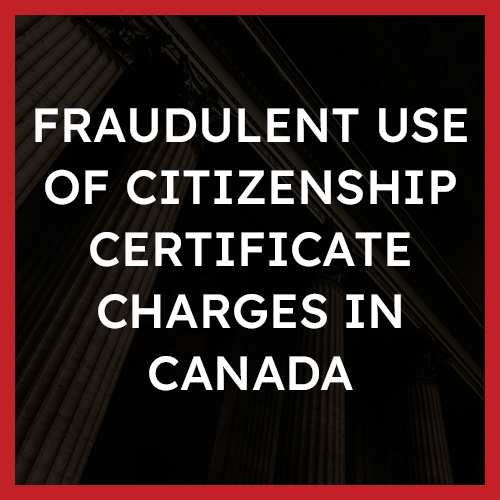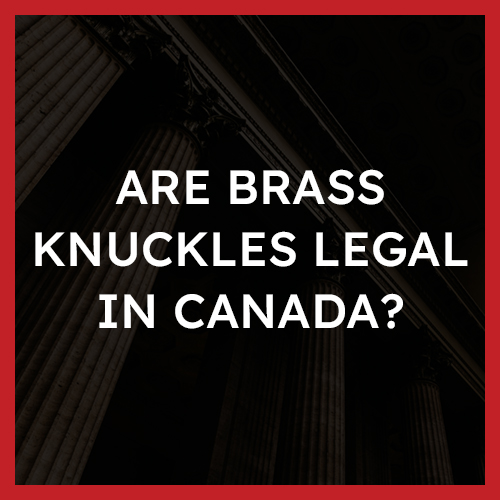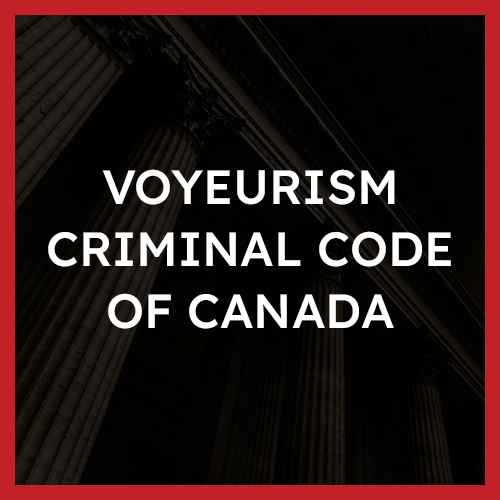Fraudulent Use of Citizenship Certificate Laws in Canada Explained

A fraudulent use of citizenship certificate occurs when a person uses a certificate of citizenship or certificate of naturalization for fraudulent purposes. This provision is also triggered when a person knowingly parts with their validly issued citizen certificate with the intent that it should be used for fraudulent purposes. Fraudulent purposes include using the certificate to obtain privileges or services that the accused, or the individual that the accused gave their certificate to, would not otherwise be entitled to.
Fraudulent use of citizenship certificate is a hybrid offence with a Crown election. This means that depending on the circumstances of your case the Crown can elect to proceed by indictment or summarily. If an accused is prosecuted by indictment, there is a Defence election of court under s. 536(2) of the Criminal Code.
Examples
Some examples of a fraudulent use of citizenship certificate charge may include the following:
- The accused is a non-citizen who purchases a citizenship certificate for the purposes of entering Canada;
- The accused provides a non-citizen their citizenship certificate for the purpose of assisting that individual in fraudulently appearing to be a citizen; and
- The accused obtained employment in Canada, despite being a foreign citizen, by using a certificate of citizenship that was not in their own name.
Defences
The defences available to a fraudulent use of citizenship certificate charge are entirely dependent on the facts of your case.
However, some defences to a fraudulent use of citizenship certificate charge may include:
- The accused was wrongly identified as the individual that used the certificate of citizenship fraudulently;
- The accused was unaware that the certificate of citizenship in their possession or use was fraudulent; and
- The accused’s Charter rights were violated.
Punishment
A fraudulent use of citizenship certificate charge is a hybrid offence, which entails a maximum punishment as follows:
- Imprisonment for a term not exceeding 2 years.
Punishments for a fraudulent use of citizenship certificate charge under s. 58(1) depend on if the Crown elects to pursue the charge as an indictable offence or summarily. There are no mandatory minimum penalties for this offence. The maximum is no more than 2 years of incarceration if prosecuted by indictment. If prosecuted summarily, the maximum punishment is no more than six months of incarceration and a potential fine of up to $5,000.
A fraudulent use of citizenship certificate charge can also entail severe consequences for current and future employment opportunities and immigration status.
Overview of the Offence
According to s. 58(1) of the Criminal Code:
Fraudulent use of certificate of citizenship
58 (1) Every person is guilty of an indictable offence and liable to imprisonment for a term of not more than two years or is guilty of an offence punishable on summary conviction who, while in or outside Canada
(a) uses a certificate of citizenship or a certificate of naturalization for a fraudulent purpose, or
(b) being a person to whom a certificate of citizenship or a certificate of naturalization has been granted, knowingly parts with the possession of that certificate with intent that it should be used for a fraudulent purpose
Definition of certificate of citizenship and certificate of naturalization
(2) In this section, certificate of citizenship and certificate of naturalization, respectively, mean a certificate of citizenship and a certificate of naturalization as defined by s. 2(1) of the Citizenship Act.
“Certificate of citizenship” is defined as a certificate of citizenship issued or granted under the Citizenship Act or under the former Act.
“Certificate of naturalization” is defined as a certificate of naturalization granted under any Act that was in force in Canada at any time before January 1, 1947.
The Guilty Act (Actus Reus)
The actus reus for a fraudulent use of citizenship certificate charge under s. 58(1) is established by proof, beyond a reasonable doubt, of the following:
- The accused uses a citizenship certificate for a fraudulent purpose; or
- The accused provides another person with the certificate of citizenship which had been granted to them.
The Guilty Mind (Mens Rea)
The mens rea for a fraudulent use of citizenship certificate charge under s. 58(1) include proving, beyond a reasonable doubt, that:
- The accused intentionally uses a citizenship certificate fraudulently; or
- The accused knowingly parts with their certificate of citizenship with an intent for it to be used fraudulently.
Defences
How to Beat a Fraudulent Use of Citizenship Certificate Charge
Every case is different. The availability and strength of any defence depend entirely on the specific facts of your case. The strength of any available defence rests on the evidence against you and the precise details of the allegations. However, the following are some common defences that may be used for a fraudulent use of citizenship certificate charge:
Factual Innocence
The strongest defence against a fraudulent use of citizenship charge under s. 58(1) of the Criminal Code is to maintain that you are factually innocent. If you can show that the facts and the evidence do not support that you fraudulently used a citizenship certificate, then you may have a defence that you were factually innocent.
Identity
Depending on the circumstances of your case, a possible defence to a fraudulent use of citizenship certificate charge may be to raise an identity defence. In this case, for this defence to be raised successfully, you will have to prove that you were not the person who fraudulently used the citizenship certificate. The identity defence could also be raised where you were not the person who provided an individual with your citizenship certificate.
No Requisite Intent
The accused may be able to argue that they did not know that the certificate of citizenship was fraudulent. If the accused has a reasonable mistaken belief that the certificate of citizenship was valid, they may be found to have not committed the offence. This defence may arise when an accused has been convinced by another that a certificate of citizenship was valid, when it was not.
Any applicable Charter defences
The Charter sets out your rights and freedoms before and after your arrest. If the police fail to abide by these rights deliberately or inadvertently, it could aid in your defence. If any of your Charter rights have been violated before or after your arrest, you may be able to have some or all of the evidence that the Crown is relying on to secure a conviction excluded under s. 24(2) of the Charter.
In R. v. Hamasaki 2020 ONSC 2579, a woman was charged with multiple offences, including fraudulent use of a citizenship certificate. On her arrest, the accused wished to call her immigration lawyer, and the arresting officer told her that she may want to choose a lawyer “more versed in criminal law”. The accused took his advice and spoke to duty counsel instead. Her police statement following her discussion with duty counsel was ultimately excluded from evidence, on the basis that her Charter rights were unjustly infringed.
Punishments
The Criminal Code provides for a possible maximum term of imprisonment of no more than 2 years for those convicted of a fraudulent use of citizenship certificate charge.
Persons found guilty of fraudulently using a citizenship certificate are eligible for sentencing entailing a discharge, suspended sentence, stand-alone fine, custody, custody with a fine or probation or a conditional sentence order.
Beyond any immediate jail and/or probation sentence you receive, there is also a discretionary DNA Order.
This is authorized as a secondary offence listed under s. 487.04 (c), (d) or (e), and the DNA order can be authorized regardless of if the Crown proceeds summarily or by indictment.
Frequently Asked Questions
Is fraudulent use of citizenship certificate an indictable offence?
Fraudulent use of citizenship certificate is a hybrid offence. This means that the Crown prosecutor can choose to prosecute someone charged with fraudulent use of citizenship certificate either summarily or by indictment. If the Crown chooses to prosecute an accused by indictment, then if the accused is found guilty, they will be charged with an indictable offence.
Can you go to jail for fraudulent use of a citizenship certificate?
If you fraudulently use a citizenship certificate under section 58(1) of the Criminal Code, you can go to jail. If the Crown proceeds by indictment, a fraudulent use of a citizenship certificate charge carries a maximum sentence of no more than two years in jail. If the Crown proceeds summarily, the maximum jail sentence is six months. Therefore, there is a possibility that you can go to jail for a fraudulent use of citizenship charge.
What is the maximum penalty for fraudulent use of a citizenship certificate?
The maximum penalty for fraudulent use of a citizenship certificate will vary depending on whether the Crown proceeds summarily or by indictment. If the Crown proceeds by indictment, a fraudulent use of a citizenship certificate charge carries a maximum sentence of no more than 2 years in jail. If prosecuted summarily, the maximum punishment is no more than 6 months of incarceration and a potential fine of up to $5,000.
Published Decisions
Regina v. Stojadnivoic Regina v. Stanojevich, [1967] 1 O.R. 388 (ONCA)
The two accused persons both utilized their certificates of citizenships to transport other individuals into the United States.
The Court found that the use by an accused person of a certificate of citizenship for the purpose of facilitating the illegal entry of another into the United States of America is not the use of the certificate “for a fraudulent purpose” within the meaning of the Criminal Code. The Court found that this is the case because the fraudulent purpose alleged can only be carried out at the United States border. The Court further noted that any other interpretation would give the provision an unintended extra-territorial effect.
The convictions were subsequently set aside, and both accused were acquitted. This case resulted in the provision being changed to include “while inside or out of Canada”, to capture incidents similar to the accused’s.
You can read the full decision here.
Benjamin v. Canada (Citizenship and Immigration), 2004 CanLII 56707 (CA IRB)
A man was deported from Canada after being charged with fraudulent use of a citizenship certificate and appealed the deportation to the immigration and refugee board. The Appellant was a citizen of Jamaica who had purchased a fraudulent citizenship certificate for a substantial sum of money. When the Appellant applied for a passport with his fraudulent citizenship certificate, immigration officials determined the certificate was fraudulent.
The Applicant was charged with fraudulent use of citizenship certificate, as well as uttering a false passport. He was sentenced to 10 days imprisonment on each charge and was deported from Canada.
You can read the full decision here.
R v. Hamasaki, 2020 ONSC 2579
The accused was arrested and charged with multiple offences, including fraudulent use of a citizenship certificate. The accused was arrested by the RCMP for criminal offences alleging the making of a false statement to obtain a Canadian passport. On her arrest, the accused wished to call her immigration lawyer, and the arresting officer told her that she may want to choose a lawyer “more versed in criminal law”. The accused took his advice and spoke to duty counsel, providing a police statement of nearly 90 minutes. The question before the Court was whether it was a mere suggestion for the accused to speak with duty counsel, or if her right to consult counsel of her own choosing had been interfered with.
Her police statement following her discussion with duty counsel was ultimately excluded from evidence, on the basis that her Charter rights were unjustly infringed.
You can read the full decision here.
Contact Us
If you have been charged with a criminal offence, visit our location pages to contact our team.
About The Author
Ask A Question
We endeavor to respond to questions within 24 hours. If your matter is urgent, please call our office or submit a request for a free consultation.







